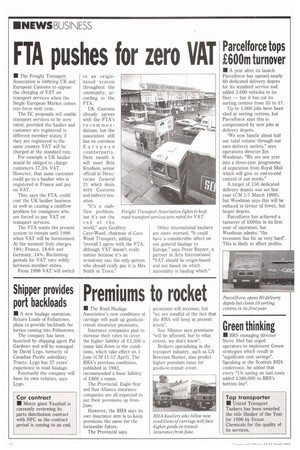FTA pushes for zero VAT
Page 14

If you've noticed an error in this article please click here to report it so we can fix it.
• The Freight Transport Association is lobbying UK and European Customs to oppose the charging of VAT on transport services when the Single European Market comes into force next year.
The EC proposals will enable transport services to be zero rated, provided the haulier and customer are registered in different member states; if they are registered in the same country VAT will be charged at the standard rate.
For example a UK haulier would be obliged to charge customers 17.5% VAT, However, that same customer could go to a haulier who is registered in France and pay no VAT.
This, says the FTA, could cost the UK haulier business as well as causing a cashflow problem for consignors who are forced to pay VAT on transport services.
The FTA wants the present system to remain until 1996 when VAT will be harmonised. At the moment Italy charges 19%; France, 18.6% and Germany, 14%. Reclaiming periods for VAT vary wildly between member states.
From 1996 VAT will switch to an originbased system throughout the community, according to the FTA.
UK Customs already agrees with the FTA's recommendations, but the association still has to convince European counterparts. Next month it will meet Brix Knudsen, senior official in Directorate General 21 which deals with Customs and indirect taxation.
"It's a cashflow problem, but it's not the end of the world," says Geoffrey Cave-Wood, chairman of Cave Wood Transport, adding "overall I agree with the FTA, although VAT doesn't really matter because it's an in-and-out tax; the only person who should really pay it is Mrs Smith in Tesco." Other international hauliers are more worried. "It could have a considerable affect on our general haulage to Europe," says Peter Rayner, a partner in Arts International. "VAT should be origin-based and not based on which nationality is hauling which."












































































